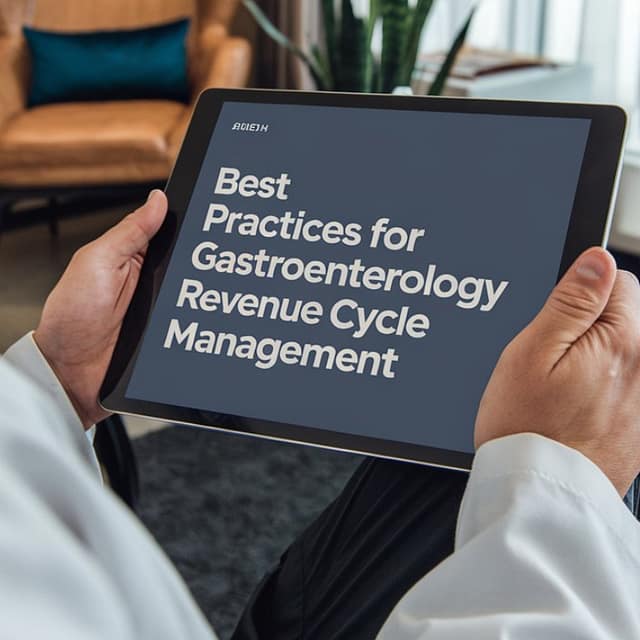
In the domain of gastroenterology revenue cycle management, the pursuit of profitability hinges on the careful management of revenue cycles. By utilizing best practices customized to the distinctive requirements of this specialized medical field, practices can access the potential for financial prosperity. From enhancing billing processes to traversing the intricacies of reimbursement, every aspect of revenue cycle management plays a crucial role in shaping the fiscal health of a practice. But what are the specific strategies that can propel gastroenterology practices towards sustainable profitability? Let’s delve into the complexities of maximizing revenue in this dynamic healthcare landscape.
In the field of healthcare practice management, the importance of implementing efficient Revenue Cycle Management (RCM) profitability strategies cannot be overstated. Within gastroenterology revenue cycle operations, it is essential to maximize profitability through the implementation of best practices in billing and revenue cycle optimization. Effective RCM solutions are vital to guarantee the financial success of gastroenterology practices.
Efficient management of the gastroenterology revenue cycle is a cornerstone of success in gastroenterology practices. Maximizing revenue cycle efficiency is vital to optimize profitability. Implementing billing optimization strategies and streamlining the billing workflow are key components to enhance revenue cycle performance. By focusing on these aspects, practices can guarantee timely and accurate reimbursement for services rendered.
To maximize profitability, it is essential to identify areas within the revenue cycle that can be improved. This includes evaluating current processes, implementing technology solutions to streamline billing procedures, and training staff on best practices. By optimizing the revenue cycle, practices can reduce denials, accelerate payment collection, and ultimately increase revenue.
Continuous monitoring and adjustment of billing practices are necessary to adapt to changing regulations and payer requirements. Regularly reviewing performance metrics and implementing necessary adjustments will help maintain a high level of revenue cycle efficiency. By prioritizing these efforts, gastroenterology practices can achieve sustainable financial success.
To nurture a culture of proactive involvement and strategic decision-making within gastroenterology practices, enhancing practice owner engagement is vital. Practice owner engagement plays an essential role in the success of revenue cycle management (RCM) within gastroenterology practices. Owners need to actively participate in RCM procedures to guarantee profitability and efficiency. By actively engaging in RCM activities, practice owners can better understand the financial health of their practices, identify areas for improvement, and make informed decisions to optimize revenue generation.
Effective time management is crucial for practice owners to dedicate ample time to RCM profitability. Setting priorities, eliminating time-consuming activities, and incorporating proven time management techniques are key strategies for enhancing time management in RCM profitability. By efficiently managing their time, practice owners can focus on critical RCM tasks, such as monitoring key performance indicators, analyzing revenue data, and implementing strategies to maximize revenue.
Maximizing the efficiency of Accounts Receivable (AR) turnaround is paramount for ensuring a steady cash flow within gastroenterology practices. To optimize AR turnaround and improve cash flow, practices must focus on efficiently converting old AR into cash flow. By implementing strategic measures within gastroenterology revenue cycle management, such as streamlining billing processes, reducing claim denials, and implementing effective collections strategies, practices can expedite the conversion of outstanding AR into revenue. Timely follow-up on unpaid claims, accurate coding, and thorough documentation are key factors in enhancing AR turnaround.
Within the field of Gastroenterology Revenue Cycle Management, achieving success hinges on the meticulous execution of key tasks that drive operational efficiency and financial sustainability. One pivotal task is ensuring billing compliance for gastroenterology procedures to prevent claim denials and maximize reimbursement rates. By maintaining accurate documentation and adhering to coding guidelines, practices can optimize revenue cycles and minimize financial risks associated with denied claims.
Another essential task for RCM success is promptly addressing claim denials. Identifying the root causes of denials, whether related to coding errors or incomplete documentation, allows for corrective actions to be implemented swiftly, ensuring timely reimbursement and cash flow stability. Additionally, monitoring and analyzing reimbursement rates for gastroenterology procedures can help practices negotiate better contracts with payers, ultimately boosting profitability.
Tracking RCM performance metrics effectively requires a systematic approach. Utilize robust software to monitor key indicators like revenue per patient, denial rate, and days in AR. Regularly analyze trends, identify areas for improvement, and implement strategic changes for best results.
To reduce claim denials, implement thorough eligibility verifications, accurate coding, clear documentation, and timely submission. Utilize denial analytics to pinpoint trends and address root causes. Regular staff training and streamlined processes can enhance claim acceptance rates and revenue flow.
Improving patient collections for better revenue involves implementing clear communication strategies, optimizing billing processes, offering payment plans, and utilizing technology for efficient transactions. Enhancing patient experience and staff training are key components for success.
In today’s healthcare landscape, technology solutions play an essential role in streamlining RCM processes. Leveraging advanced software can automate tasks, enhance accuracy, and improve efficiency. Integrating such solutions can optimize revenue cycles and boost financial performance.
Traversing changing billing regulations is akin to sailing through shifting tides. Ensuring compliance requires constant monitoring, staff education, and proactive adaptation. Implementing robust systems, regular audits, and staying abreast of regulatory updates are essential strategies.
For Patient revenue cycle management for gastroenterology practices , effective patient RCM ensures that the financial aspect of providing specialized care is managed efficiently, reducing delays, preventing revenue leakage, and supporting the overall sustainability of the practice.
To sum up, implementing best practices in gastroenterology revenue cycle management is essential for maximizing profitability and ensuring the financial health of the practice. According to a recent study by the Medical Group Management Association (MGMA), practices that focus on optimizing revenue cycle performance can increase their revenue by up to 30%. By streamlining billing workflows, enhancing practice owner engagement, and optimizing accounts receivable turnaround, gastroenterology practices can achieve long-term financial success and sustainability.
Get started free consultation with EZ Settle Solutions!
Contact us at 346-335-4093 / info@ezsettlesolutions.com or schedule a free consultation to learn more about how we can assist you.